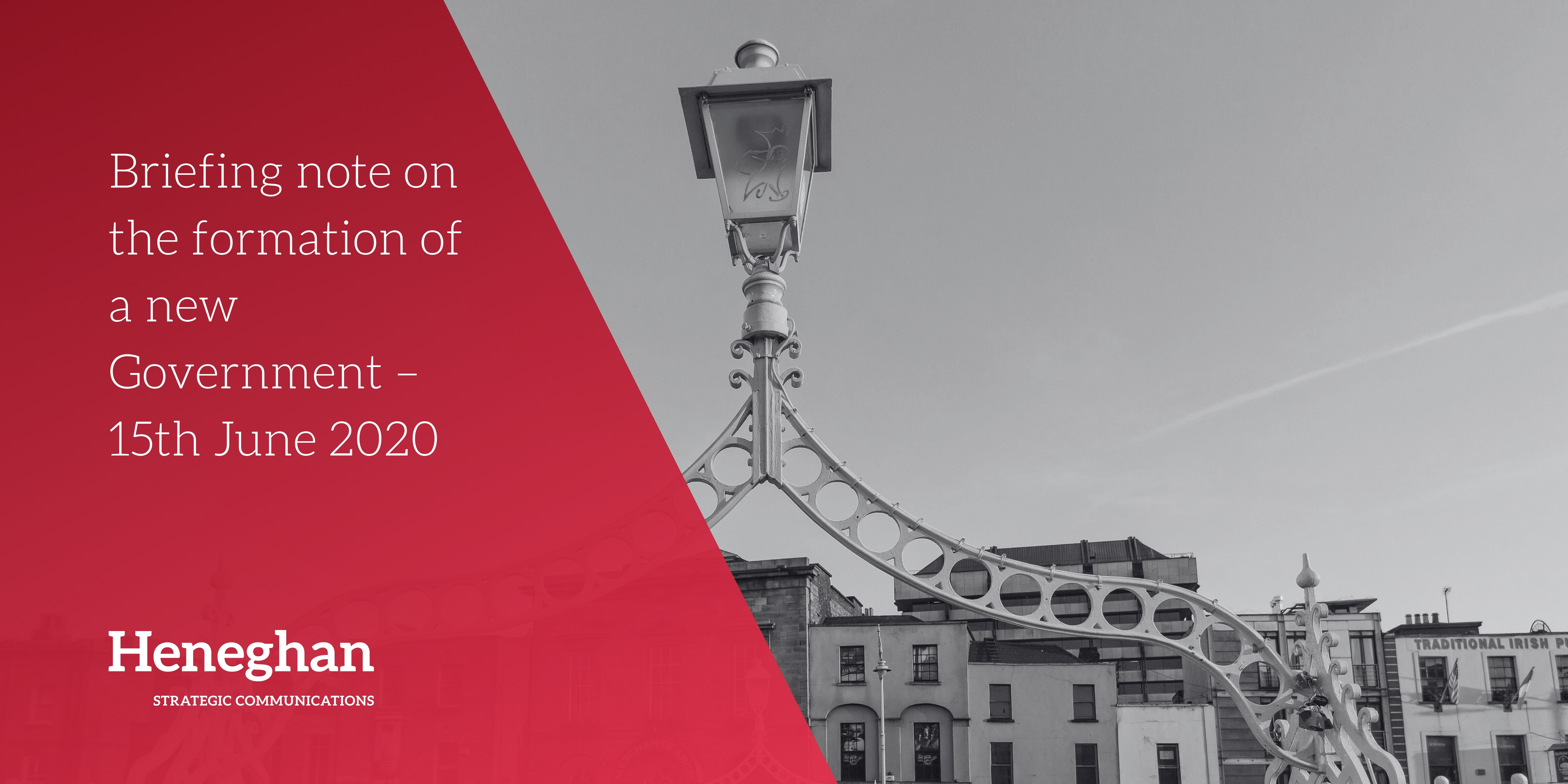
Briefing note on the formation of a new Government – 15th June 2020
In light of the publication of a draft agreement on a Programme for Government, the Heneghan Public Affairs team outlines the current political situation and what is expected to happen next in the coming weeks
Finally after 129 days since the February General Election, three parties: Fianna Fáil (FF), Fine Gael (FG) and the Green Party (GP), have reached an agreement on a Programme for Government (PFG). The final blocks of the agreement were approved by the three party leaders this morning which allowed the publication of the 139 page document below.
Link to PFG: https://docs.google.com/file/d/1fVChGUMfzY1LkBPMDllxokHMnRSBU2Tk/view
The three parliamentary parties are expected to meet in the next 24 hours to debate the contents of the agreement.
Once approved by the members of the three parliamentary parties, the document will then be circulated to all registered FF/FG/GP party members who will cast their vote on whether to approve entry into Government based on the agreed programme.
Parties Voting on the PFG
While it is expected that each party leader will recommend acceptance of the PFG to their members, at the time of writing the position of the Deputy Leader of the Green Party, Catherine Martin is not publicly known. Deputy Martin is challenging Deputy Eamon Ryan for the leadership of the Green Party but as she leads the Green Party’s PFG negotiations team, it is expected that she will endorse the agreement, which could be pivotal as the party’s rules require a two-thirds (2/3) majority to pass a motion of this nature.
The voting systems within FF and FG are different:
FF has a one-member, one-vote straight ballot among party members, with postal ballots likely to be sent out in the next day or so.
FG has a more complicated electoral system, involving delegates from each constituency, the Executive Council and the party’s elected representatives. However, the parliamentary party makes up 50 per cent of the electoral college, so this is by far the most important voting block.
Due to Covid 19 restrictions, it is expected that it will take the parties up to two weeks to conduct the voting. All have agreed to announce the ballot results on the same date, which has yet to be confirmed. However, due to the urgent need to renew the Offences Against the State Act taken before June 30th, the voting deadline can’t be extended beyond the end of next week.
Why the Tight Deadline:
A vote to renew the Offences Against the State Act is held every year and is normally a formality. However, unless a new Taoiseach is in place to make 11 nominations to the Seanad, the vote can’t be held in the upper house which could lead to legal complications.
Therefore, the Dáil needs to elect a new Taoiseach, who will then form a new Government and make his nominations to the Seanad before June 30th, to allow a vote to take place in that house on the deadline date for the Offences Against the State Act of the 30th June, which is a fortnight from tomorrow (16th June).
Who will be Taoiseach?
The expectation is that Micheál Martin (FF) will be the agreed nominee of the new coalition for the role of Taoiseach, with Leo Varadkar taking a Cabinet role and that of Tánaiste. Leo Varadkar, or rather whoever the leader of Fine Gael will be, is expected to become Taoiseach halfway through the new Government’s five-year term.
If Micheál Martin is elected by the Dáil, he will then nominate his Cabinet later that day, which would require another Dáil vote. He would also nominate his 11 Senators that will have been subject to agreement with the other two party leaders.
Cabinet Roles:
It is expected that the 15 Cabinet roles will be allocated on a 6:6:3 ratio, with FG and FF having six members each, and the GP three. However, this is speculative at this stage. Furthermore current speculation is that each of the three parties will have a “super junior”. Minister of State permitted to attend Cabinet, as they do at present, but with no vote. The Government Chief Whip also attends.
There will be intense speculation over the coming weeks about who the various roles will go to. It is a particularly tricky situation for the current Taoiseach, who will have to demote several FG senior and junior Ministers.
What if the Parties reject the PFG?
Sources in all parties agree that while FF and FG are odds-on to accept the deal, it is impossible to predict the outcome among the GP at this stage. If that party rejects the agreement, sources say FG and FF will seek to go ahead and form a Government with the
support of a number of independent TDs. In such a scenario, the climate action aspects of the PFG agreed with the GP are likely to be watered down.
However, there is no certainty that such an agreement could be put together quickly, or at all. The country would be plunged into a political crisis, and there would be a fierce clamour for a general election.
If you have any questions regarding the incoming Government, feel free to contact a member of the team - https://heneghan.ie/contact-us/



